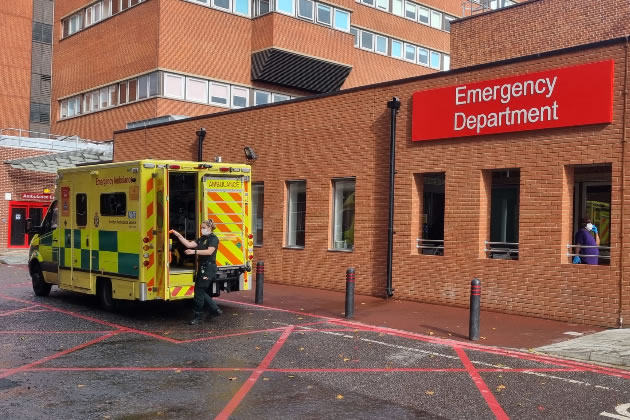Man Died After Five Hour Wait at St. George's A&E
Coroner finds that long delays for treatment are not unusual

The Accident and Emergency unit at St. George's Hospital
December 27, 2024
A man needing urgent treatment died after waiting more than five hours in A&E for a diagnosis at an overstretched St George’s Hospital, in Tooting. Junior Powell, 57, died on September 6, 2021, from intestinal ischaemia and aortic dissection.
In a prevention of future deaths report which has now been issued, Fiona Wilcox, senior coroner for Inner West London, ruled a five-hour delay in reviewing Mr Powell’s condition likely contributed to his death. She said a lack of treatment for the reduced flow to his arteries caused by his aortic dissection was another factor.
Mr Powell arrived at St George’s at around 10pm on September 3 with severe abdominal pain and vomiting. An initial CT scan did not find the cause of his symptoms. He was reviewed at 5.15am on September 4 by the medical registrar, as she was concerned about his pain and declining condition.
Further analysis of Mr Powell’s CT scan results revealed subtle changes, which prompted further imaging of his vascular system. This showed an abdominal aortic dissection, reduced blow flow to his abdominal arteries and evidence of intestinal ischaemia.
Mr Powell underwent a bowel resection later that morning, but received no surgical treatment to restore blood flow to his abdominal arteries or treat the dissection in his aorta. This meant his condition continued to decline and his abdominal organs became further damaged.
Despite further resection of Mr Powell’s necrotic gall bladder and damaged bowel on September 5, he died the following afternoon.
Ms Wilcox found that if mechanical restoration of blood flow to Mr Powell’s abdominal arteries had been carried out on September 4, he likely would not have died at this time.
She wrote, “There was a more than five-hour delay before Mr Powell was reviewed by the medical registrar and he should have been in a bed in the medical ward by 1.15am. This delay was caused by shortage of staff during that night and he was eventually seen by the medical registrar who should have been based on the ward, not seeing patients in accident and emergency.
“Evidence was taken that confirmed that such delays are usual, not just in St George’s Hospital, and delays in admission to the wards are caused largely by the inability to discharge patients who are fit for discharge due to lack of suitable social support in the community. In this case, treatment for Mr Powell was time critical and as such this delay probably contributed to his death.â€
The coroner sent the report to the Department of Health and Social Care (DHSC) after warning action should be taken to prevent future deaths. She said she was concerned that ‘delay in discharge for patients ready to be discharged due to lack of suitable social care in the community is causing congestion in the hospital admission process, delaying medical assessment and thus diagnosis of conditions that need urgent treatment and increasing the likelihood of death for such patients’.
A St George’s University Hospitals NHS Foundation Trust spokesperson said: “We offer our deepest condolences to Mr Powell’s family and friends following his sad death. As with the wider NHS, timely discharge and admission of patients remains a challenge – to ease the pressures, we’ve introduced measures including expanding our same day emergency care to treat patients without admission to hospital, and working with system partners to make use of virtual wards so people can receive care in the community.â€
A DHSC spokesperson said: “Our deepest sympathies are with Junior’s family and friends in this tragic case. We consider every prevention of future deaths report carefully and will respond in due course. Our 10-year health plan, backed by a £26billion boost for the NHS and social care, will shift the focus of care from hospital to community and we will tackle delayed discharges by developing local partnerships between the NHS and social care.â€